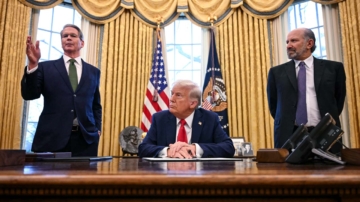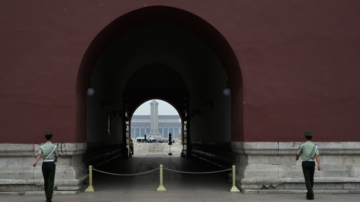【新唐人2011年8月10日讯】“标准普尔”(Standard and Poor's)调降美国国债评级,造成全球主要经济体极大的震撼。但很多国家的反应都比较和缓,唯有中共显得怒气冲冲。专家认为,这是中方一贯贬低美国的做法,也是转移国内民众对本国经济的视线。
最近美国国债评级被下调后,美国最大债权国----中国,在中共喉舌媒体《新华社》发表了措辞尖锐的英文社论,声明中国现在“完全有权利”要求美国正视自身的结构性债务问题,并保障中国的美元资产安全。社论说,山姆大叔必须“面对痛苦的现实:他们可以轻松借钱了事、解决自己造的孽,这种好日子终于一去不复返了”。
《法国国际广播电台》有文章指出,对中共喉舌的这番评论,西方众多媒体的评价是“十分刻毒”。尽管中国手中捏着一万亿美元以上的美国债券,这种毫不体谅、咄咄逼人的刻薄态度,还是让舆论感到震惊。
留美大陆经济学家程晓农分析了中共当局这一激烈表现的原因。
程晓农:因为中国(共)政府长期以来对美国的宣传是一种贬低的基调,所以只要有机会能够贬低(美国),中国(共)政府不会放过这样的机会的,所以这次这个机会不会放过也是很自然的。当然另一方面,中国(共)政府可能也希望转移国内民众对本国经济的一个重点,因为似乎把现在全球性的问题说的都很严重,那么这样的话,中国自己也就不会那么重要了。我想这是中国(共)政府的一个考虑。”
香港《蘋果日报》发表了一篇题为《探针:美国降级 中国更‘肉紧‘》文章,文章指出,美国被调低债务评级,最“肉紧”的不是美国政府或国会,而是中国(共)政府。“标普”宣布降级才四天的时间,《新华社》已几次发表措词强硬又尖酸的评论,指美国当局不负责任,指两党议员是顽童,拿全球经济及金融安全“较飞”!
文章进一步指出,《新华社》的评论最显而易见的是那份“肉紧”、焦急与无奈,有种上错“贼船”又无计可施的味道。
文章还分析道,美债被降级,美国当然受损,但中国(共)政府作为美国国债最大买家及拥有人,它的实质损失短期内可能更大。根据最新统计,中国持有至少一万一千亿美元各种年期的美国国债,是它整个外汇储备组合的一半。“标普”调低美国国债评级,意味这大笔储备风险上升,可能会贬值。只要美债跌价百分之三,中国(共)政府就输掉三百亿美元﹔跌得再厉害的话,损失将更为不菲。中国(共)政府感到“肉痛”、“肉紧”实在自然不过。
而英国《金融时报》刊登驻北京记者霍克的报导,文章指出,尽管中国(共)批评美国的言辞激烈,但是在可以预见的未来,中国(共)仍会继续把增长的外汇储备投资到美国政府债券上。
报导说,由于缺乏除美元之外的其他外汇储备选择,也由于欧洲出现的债务危机,中国将被迫继续在短期内购买美元。
新唐人记者刘惠、林慧心、薛莉采访报导。
CCP Criticizes Lowered U.S. Debt Rating
Standard and Poor's downgrading of the U.S. national
debt rating has shocked major global economies.
However, many countries have responded relatively mildly,
with only the Chinese authorities being enraged.
However, experts believe that this is part of China's
ongoing practice of belittling the U.S.
At the same time, it serves to divert domestic attention away
from the Chinese Communist Party's (CCP) economic woes.
After the U.S. national debt's credit rating was downgraded,
the largest U.S. creditor, China, published a sharply worded
editorial in English on the CCP's mouthpiece Xinhua's site.
It declared that China now has the right to ask the U.S
to address its own structural debt problems,
and to protect the safety of China's assets in U.S. dollar.
The editorial said that Uncle Sam must face its painful reality,
that is, previously Americans could easily borrow money
to settle their debts, the good old days in the U.S. are gone.
Radio France Internationale published an article on
Western media reactions,
pointing out that many of them found
the CCP mouthpiece's comments "very spiteful."
Although China holds U.S. bonds of more than USD$1 trillion,
the CCP's unforgiving, aggressive, and caustic attitude
still shocked the international community.
U.S.-based economist, Cheng Xiaonong, analyzed the reasons
behind the CCP regime's intense reactions.
Cheng Xiaonong: "As the Chinese government always has
a derogatory tone when propagandizing the U.S.,
as long as there is an opportunity to belittle the U.S.,
the CCP will not miss it.
It didn't miss this last opportunity to belittle the U.S., either.
On the other hand, it wants to divert the Chinese people's focus
away from China's domestic economy.
It seems to portray all global problems as very serious,
so as to diminish the importance of China's issues.
I think this is the Chinese regime's approach.”
Hong Kong's Apple Daily published an article entitled,
"Probe: U.S. Debt Downgraded; China Is More Nervous.”
The article said that after the credit downgrade of the U.S. debt,
the most nervous party was not the U.S. government
or Congress, but the Chinese regime.
Only four days after the S&P's downgrade announcement,
Xinhua has issued some strongly worded, biting commentaries,
calling the U.S. authorities “irresponsible” and accusing
them of “increasing the world's economic risks and perils.”
The Apple Daily article pointed out that Xinhua's article
showed the CCP's nervousness, anxiety, and helplessness.
The article claimed that the U.S.'s credit downgrade damages
the Chinese regime more than the U.S, in the short-term,
as China is the largest holder of U.S. Treasury bonds.
As per the latest statistics, China holds at least US$1.1 trillion
worth of U.S. Treasury bonds of various maturities,
which represents half of China's foreign reserve portfolio.
S&P's lowering of the U.S. debt rating means large reserves
are at risk of being devalued.
If the U.S. debt were devalued by three percent, the CCP regime
would lose US$30 billion.
The greater the bond value falls, the more losses China will incur.
Therefore, it makes sense that the CCP is going to be nervous.
The Financial Times published an article, pointing out that
although the CCP strongly criticizes the U.S.,
it will continue to invest its growing foreign exchange reserves
in U.S. Treasuries.
The article stated that due to both the lack of foreign exchange
reserves, besides the U.S. dollar, and Europe's debt crisis,
China will be forced to buy U.S. dollars, in the short term.
NTD reporters Liu Hui, Lin Huixin and Xue Li
最近美国国债评级被下调后,美国最大债权国----中国,在中共喉舌媒体《新华社》发表了措辞尖锐的英文社论,声明中国现在“完全有权利”要求美国正视自身的结构性债务问题,并保障中国的美元资产安全。社论说,山姆大叔必须“面对痛苦的现实:他们可以轻松借钱了事、解决自己造的孽,这种好日子终于一去不复返了”。
《法国国际广播电台》有文章指出,对中共喉舌的这番评论,西方众多媒体的评价是“十分刻毒”。尽管中国手中捏着一万亿美元以上的美国债券,这种毫不体谅、咄咄逼人的刻薄态度,还是让舆论感到震惊。
留美大陆经济学家程晓农分析了中共当局这一激烈表现的原因。
程晓农:因为中国(共)政府长期以来对美国的宣传是一种贬低的基调,所以只要有机会能够贬低(美国),中国(共)政府不会放过这样的机会的,所以这次这个机会不会放过也是很自然的。当然另一方面,中国(共)政府可能也希望转移国内民众对本国经济的一个重点,因为似乎把现在全球性的问题说的都很严重,那么这样的话,中国自己也就不会那么重要了。我想这是中国(共)政府的一个考虑。”
香港《蘋果日报》发表了一篇题为《探针:美国降级 中国更‘肉紧‘》文章,文章指出,美国被调低债务评级,最“肉紧”的不是美国政府或国会,而是中国(共)政府。“标普”宣布降级才四天的时间,《新华社》已几次发表措词强硬又尖酸的评论,指美国当局不负责任,指两党议员是顽童,拿全球经济及金融安全“较飞”!
文章进一步指出,《新华社》的评论最显而易见的是那份“肉紧”、焦急与无奈,有种上错“贼船”又无计可施的味道。
文章还分析道,美债被降级,美国当然受损,但中国(共)政府作为美国国债最大买家及拥有人,它的实质损失短期内可能更大。根据最新统计,中国持有至少一万一千亿美元各种年期的美国国债,是它整个外汇储备组合的一半。“标普”调低美国国债评级,意味这大笔储备风险上升,可能会贬值。只要美债跌价百分之三,中国(共)政府就输掉三百亿美元﹔跌得再厉害的话,损失将更为不菲。中国(共)政府感到“肉痛”、“肉紧”实在自然不过。
而英国《金融时报》刊登驻北京记者霍克的报导,文章指出,尽管中国(共)批评美国的言辞激烈,但是在可以预见的未来,中国(共)仍会继续把增长的外汇储备投资到美国政府债券上。
报导说,由于缺乏除美元之外的其他外汇储备选择,也由于欧洲出现的债务危机,中国将被迫继续在短期内购买美元。
新唐人记者刘惠、林慧心、薛莉采访报导。
CCP Criticizes Lowered U.S. Debt Rating
Standard and Poor's downgrading of the U.S. national
debt rating has shocked major global economies.
However, many countries have responded relatively mildly,
with only the Chinese authorities being enraged.
However, experts believe that this is part of China's
ongoing practice of belittling the U.S.
At the same time, it serves to divert domestic attention away
from the Chinese Communist Party's (CCP) economic woes.
After the U.S. national debt's credit rating was downgraded,
the largest U.S. creditor, China, published a sharply worded
editorial in English on the CCP's mouthpiece Xinhua's site.
It declared that China now has the right to ask the U.S
to address its own structural debt problems,
and to protect the safety of China's assets in U.S. dollar.
The editorial said that Uncle Sam must face its painful reality,
that is, previously Americans could easily borrow money
to settle their debts, the good old days in the U.S. are gone.
Radio France Internationale published an article on
Western media reactions,
pointing out that many of them found
the CCP mouthpiece's comments "very spiteful."
Although China holds U.S. bonds of more than USD$1 trillion,
the CCP's unforgiving, aggressive, and caustic attitude
still shocked the international community.
U.S.-based economist, Cheng Xiaonong, analyzed the reasons
behind the CCP regime's intense reactions.
Cheng Xiaonong: "As the Chinese government always has
a derogatory tone when propagandizing the U.S.,
as long as there is an opportunity to belittle the U.S.,
the CCP will not miss it.
It didn't miss this last opportunity to belittle the U.S., either.
On the other hand, it wants to divert the Chinese people's focus
away from China's domestic economy.
It seems to portray all global problems as very serious,
so as to diminish the importance of China's issues.
I think this is the Chinese regime's approach.”
Hong Kong's Apple Daily published an article entitled,
"Probe: U.S. Debt Downgraded; China Is More Nervous.”
The article said that after the credit downgrade of the U.S. debt,
the most nervous party was not the U.S. government
or Congress, but the Chinese regime.
Only four days after the S&P's downgrade announcement,
Xinhua has issued some strongly worded, biting commentaries,
calling the U.S. authorities “irresponsible” and accusing
them of “increasing the world's economic risks and perils.”
The Apple Daily article pointed out that Xinhua's article
showed the CCP's nervousness, anxiety, and helplessness.
The article claimed that the U.S.'s credit downgrade damages
the Chinese regime more than the U.S, in the short-term,
as China is the largest holder of U.S. Treasury bonds.
As per the latest statistics, China holds at least US$1.1 trillion
worth of U.S. Treasury bonds of various maturities,
which represents half of China's foreign reserve portfolio.
S&P's lowering of the U.S. debt rating means large reserves
are at risk of being devalued.
If the U.S. debt were devalued by three percent, the CCP regime
would lose US$30 billion.
The greater the bond value falls, the more losses China will incur.
Therefore, it makes sense that the CCP is going to be nervous.
The Financial Times published an article, pointing out that
although the CCP strongly criticizes the U.S.,
it will continue to invest its growing foreign exchange reserves
in U.S. Treasuries.
The article stated that due to both the lack of foreign exchange
reserves, besides the U.S. dollar, and Europe's debt crisis,
China will be forced to buy U.S. dollars, in the short term.
NTD reporters Liu Hui, Lin Huixin and Xue Li








